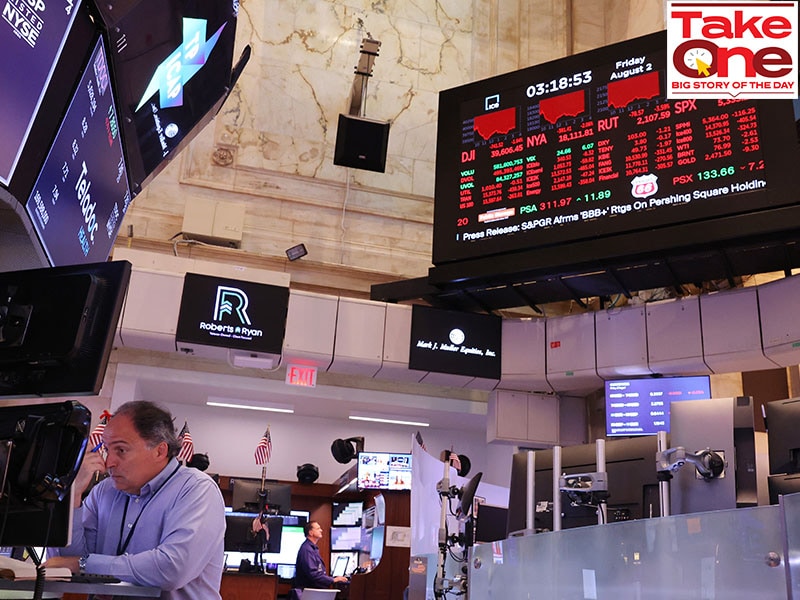
Is the massive global sell-off in equity markets an instance of a butterfly flapping its wings in New York and causing a tornado in Japan? Some could argue it’s the unwinding of yen carry trades worth billions of dollars that spooked the bulls. Either way, the week started on a sombre note as fear gripped markets and investors rushed to square off holdings to cut losses.
Japan’s benchmark Nikkei 225 suffered its biggest ever one-day loss: It ended the trading session over 12 percent lower on Monday and 24 percent over a one-month period. Quickly, the rout deepened and stocks tumbled across Asian markets: KOSPI by 14 percent, Taiex by 8.4 percent, Hang Seng Index and Shanghai Composite Index by 1.5 percent each.
Dalal Street felt the tremors too. India’s Volatility Index rose by 42.18 percent and over Rs 15 lakh crore of wealth was wiped off in a single trading session. The BSE Sensex and the Nifty 50 fell 2.7 percent.
However, Christopher Wood, global head of equity strategy, Jefferies, believes India is relatively better placed than most emerging market peers to ride out the global mayhem, because it’s not heavily reliant on foreign investors now.
“The Indian stock market is much more resilient in the face of a US downturn and related Wall Street sell-off than the likes of Japan. This is mainly because India’s stock market has been driven by domestic money, whereas the opposite remains the case in Japan,” Wood said in a weekly note to investors.
In fact, the recent bull-run was largely driven by domestic flows. According to data, in the June quarter, FIIs hold 17.38 percent stake in NSE listed companies whereas DIIs own 16.23 percent. The ownership-gap has narrowed to a historic low of 115 basis points showing the growing dominance of local investors. Besides, retail participation in stock markets has significantly increased in the last five years.
However, though India is the fastest growing economy in the world, a possible major economic downturn in the US, or the potential impact of the unwinding of the Japanese yen carry trades, can roil the sentiment on the Street and rein in the raging bulls.
“This is likely to be a medium-term correction, which will provide a long-term investment opportunity for the patient investor. One must keep return expectations low in the short-term, and keep investing systemically over the medium-term with an eye to reap benefits from the growth over a long period of time,” says Sandeep Bagla, CEO, Trust MF.
Most experts believe the markets are likely to be nervous until the US consumer price report is released on August 14. Post-pandemic, markets have seen an unprecedented rebound as stocks hit fresh highs. But the growing fear of a recession in the US is keeping traders on tenterhooks and investors want to wait before they take the plunge.
Also read: How will the Sebi whiplash on F&O transform the stock trading landscape?
The US unemployment rate rose to a three-year high to 4.3 percent, above the Federal Reserve’s year-end estimate, and it triggered fears of a looming recession. Goldman Sachs economists increased the probability of a US recession over the next 12 months to 25 percent from 15 percent earlier and JP Morgan’s analysts see a 50 percent probability that the US economy will degrow in the coming one year.
Following the grim economic data released on Friday, the yield on the benchmark 10-year US Treasury declined almost 40 basis points to 3.75 percent on the hope that the US Federal Reserve would cut interest rates by more than a full percentage point this year and 50 bps in September.
Wall Street’s volatility index hit its highest since March 2023. US stock futures declined over 1 percent in the early hours of Monday morning as Asian markets bled.
To arrest the weakness of the yen, The Bank of Japan raised interest rates by 15 basis points to 0.25 percent on July 31. It also signalled further rate hikes in the coming months. This came as a big blow for global investors. A rising yen is likely to hurt exporters and companies with overseas exposure.
The yen surged 2.2 percent against the US dollar on Monday and almost 5 percent last week. The strength of the Japanese currency has pushed many global market investors to unwind the yen carry trade which has resulted in the sell-off of equities.
